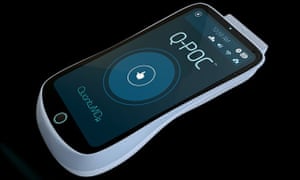
Advances in disease diagnostics now offer clinicians a staggering degree of accuracy. But access to results generally requires a well-equipped lab and a few weeks’ waiting time.
But that could soon change thanks to a new, low-cost diagnostic DNA analyzer the size of a smartphone.
Q-Poc, billed as a “handheld lab”, is the idea of British-based tech firmQuantuMDx, which says the analyzer can accurately diagnose everything from cancers to infectious diseases in a matter of minutes. Currently in the alpha testing stage, the company hopes to get the product in the hands of doctors by early 2018.
“We’re now at the point that we have a working prototype that can perform a highly sensitive tuberculosis test from a sample through to results in 15-20 minutes,” says Jonathan O’Halloran, the company’s co-founder. “The technology is now being ramped up to beta stage and we hope to start manufacturing towards the end of this year.”
“We’re now at the point that we have a working prototype that can perform a highly sensitive tuberculosis test from a sample through to results in 15-20 minutes,” says Jonathan O’Halloran, the company’s co-founder. “The technology is now being ramped up to beta stage and we hope to start manufacturing towards the end of this year.”
The handheld apparatus, which runs on a solar-powered battery or wind-up device, is designed to read biological samples submitted via a credit card-size cartridge (think of it as a sophisticated Game Boy). It can work with a range of sample types. Swabs can be used to detect sexually-transmitted infections, while sputum is used to detect tuberculosis.
Q-Poc differs from most conventional point-of-care diagnostic tools in that it analyses the DNA of pathogens rather than the proteins within the sample. The device depends on microfluidic technology , which essentially allows fluids to pass through different microscopic channels of different diameters.
A chemical process then breaks down the sample into a molecular soup , which is then forced through a nanoscale-based filter system. The filter is coated with a negatively charged polymer, which repels the DNA as other molecules are held back, thereby isolating the DNA for analysis.
“It sounds simple, but it is absolutely groundbreaking,” says the 40-year-old O’Halloran, who has a background in molecular genetics. “Nothing out there on the market can come close to its speed and proficiency.”
The potential of O’Halloran’s invention to “change the face of healthcare globally” saw him named 2015 European Chief Technology Officer of the Year (small business category) by Eirma, an industrial research association. The award’s judges gave particular praise to the technology’s developing world focus, especially at a time when the threat of drug resistant superbugs are on the rise.
Founded in 2008, QuantuMDx has so far raised £21m ($30m) in funding, with more to come. While the hope is for the handheld device to be used by doctors or lab technicians, its real breakthrough application rests in getting it into the hands of frontline health workers.
Subject to regulatory approval by the World Health Organization (WHO), QuantuMDx hopes to initially roll out the Q-Poc unit in South Africa, before expanding to other markets across the continent. The startup already counts a number of development nonprofits among its strategic partners, including the Gates Foundation and the Clinton Foundation.
“When we started this, we were very clear that we wanted to address the infectious disease global health challenges and clearly these are in developing nations,” says O’Halloran. But he doesn’t rule out the benefits of the technology in developed countries. “Let’s not forget, even [the London borough of] Tooting has a prevalence of TB [tuberculosis] higher than many parts of India.”
Q-Poc will initially be used to detect tuberculosis, with tests for other disease conditions added at a later date. The device has built-in cellphone technology, enabling the test results to be geo-stamped and shared in real time, potentially opening the door to continuous monitoring of disease and antimicrobial resistance.
The prospect of seeing health workers undertaking speedy diagnoses at a patient’s side in a matter of minutes is exciting, and potentially lucrative. According to a recent report released by US market analysis firm BCC Research, the total global market for portable medical equipment is set to hit $65.7bn next year, up from $54.2bn at present. Demand for miniaturized devices for point-of-care diagnostics is cited as a driving factor in the market’s rapid growth.
But realizing that potential will come with its own set of challenges. QuantuMDx first needs to prove the efficacy of Q-Poc in a “significantly large” clinical trial, the cost and scale of which is onerous for any startup. And, despite O’Halloran’s confidence in the technology, gaining WHO endorsement “could take years”, he concedes. He hopes that current discussions between WHO and the Gates Foundation will see the trail process for small businesses “streamlined” in the near future.
The second determinant of success will be price. QuantuMDx anticipates that each test should cost no more than £3 ($4.30), an attractive proposition for the health ministries that comprise its primary market in the developing world. The company’s initial target price for the device is around £1,000 ($1,437), but it believes this can be reduced to around one-third of that figure in a few years’ time.
Clinical trials of the Q-Poc are planned for later this year in South Africa, in association with the University of Cape Town and the University of Stellenbosch, where some of the early research into the technology was carried out.
“Essentially, we need to prove [to health ministries] that by using our tests, which offer benefits in terms of costs and speed, that we will be providing savings for the health care system,” O’Halloran says.



0 comments:
Post a Comment